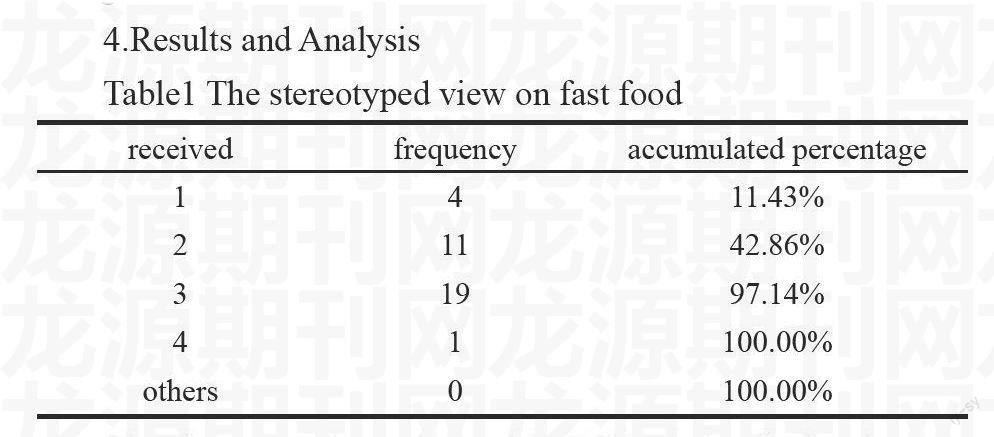The Influence of Instructed English Teaching on ExistingStereotypes on America
Xu Ying Ji Xuejuan

The present study aims at surveying the influence of instructed English learning on learners existing stereotypes about the American people and determining the effects of these stereotypes on their language learning and cultural openness.The result shows that the instructive teaching and the instructional material have few influence on their existing stereotypes and impressions on America.The major factors which have a great influence on stereotypes are the communication with the native people of target language country and watching the films and its documentaries about the target country.
1.Subjects
At the last semester, the author gave out the questionnaire which was designed on the basis of borrowing partly from others and partly self-made to 35 Chinese students who are major in English.Then ten students were selected randomly from the 35 to take part in the interview face to face.
2.Methods
The documentary method, questionnaire method, interviewing method and other integrate analysis method were used in this essay.After the preparing work, the relative literary were read carefully, and till had a clear idea of how to format this thesis.Then, it was the time to put the work into survey and writing.Finally, we employed the statistic tool(Microsoft Excel 2003) to analyze the typed data collected from the questionnaire and interview.
3.Procedure
In this essay, a survey is critical part which is an obvious proof to show students attitude toward America.Then, the interview is a further step on this theme, but its result will not discussed here because of the limited pages.Last, writing becomes the main task, in which the statistic tool(Microsoft Excel 2003) was employed to analyze the data in detail, and then a conclusion was got.
4.Results and Analysis
The first question, showed in Table 1, is “what is your stereotyped view on fast food”.Four students in thirty-five chose the selective answer A,(it is tasty) eleven students chose selective answer B(it is expensive)and nineteen students think it is unhealthy and tastes bad, only one student say never eat it.Throughout the chart, nearly 55% of students think fast food is expensive and not healthy.The fast food can easily make people fat.
The data above shows two students chose selective answer A( often dine there), and eleven student chose B( sometimes go to western-style restaurant), and twenty students chose they go to western-style restaurant occasionally, only two students chose never go to there.From this point, students go to western-style restaurant occasionally.
For this question, twenty-five students chose answer A( like the hip-hop).Two students chose B( dislike).Two students chose C(do not understand it).The other six students chose D( they sometimes like it, sometimes do not like it).It can be conclusion that most student like the hip-hop, because it is the popular culture.
Table 4 The stereotyped view on English songs
This question is to survey the stereotyped view on English songs, because songs belong to the popular culture which is a reflection of the society.In general, over the half like it very much, so it is easy to see 31 out 35 students chose often and sometime listen to it, few students have not listen to it.
Table 5 The stereotyped view on the western festival
In allusion to the western festival, twenty-seven students have interests in it.Three have great interests and five students say they have no interest.Most students have the interest, but do not have much impetus to learn more about it, which should be a pity for the foreign language learners, because the festival is one of the key parts in target languages culture.
Table 6 The stereotyped view on English language
According to the data, most of students admire the native Chinese who can speak English fluently; because they can speak a fluently English means they will get more chances in the future.Twenty-two students chose the answer A, they envy the native Chinese people who can speak the fluent English very much, and ten students think they envy them, while the other three do not envy them.
The others think that it can be understood, because no child means less burden.Six people chose the answer A, they can not understand DINK family, but twenty-three students think that they can accept this kind of thought.Modern DINK family can be accepted in modern age.Five students chose the answer that it is very good.From the table 7, we can see most of students can accept the modern family thought, and throughout the western culture learning, they become open in culture recognition.
For the theme of American educational system, most of students hold the opinion that different nation has different educational system, and they all have their own advantages and disadvantages.Twenty-four students chose the answer C; it has both the advantage and disadvantage.Eight students chose the American educational system is very good for the students.Two students think it is bad.
For American family culture, twenty-four students think they are unconventional family.Eight students think they are progressive or advanced family, which enjoys fight for freedom.While two people think they are dream catcher family, in which family members are optimistic to chasing their dreams.And only one student thinks they are loyal family.All in all most of then think they are not the conventional family.
The tenth question is to survey the stereotyped view on American capitalist economy.Almost everyone thinks that each country has its own politics and economy system.
The whole study took nearly one year, and the whole survey was designed and conducted step by step with good logic.The result shows that the instructive teaching and the instructional material have few influence on their existing stereotypes and impressions on America.
Reference:
[1]Amanda B.Diekman.Dynamic Stereotypes about Women and Men in Latin America and the United States.Journal of Cross-Cultural Psychology March,2005(36): 209-226.
[2]Biernat,M.,& Ma,J.E.Stereotypes and the confirmability of trait concepts.Personality and Social Psychology Bulletin,2005,(31):483-495.
[3]Freytag,P.Sender-receiver constellations as a moderator of linguistic abstraction bias.In Y.Kashima,K.Fiedler,& P.Freytag(Eds.),Stereotype dynamics: Language-based approaches to stereotype formation,maintenance,and transformation(page.213–237).2008,Mahwah,NJ: Erlbaum.

